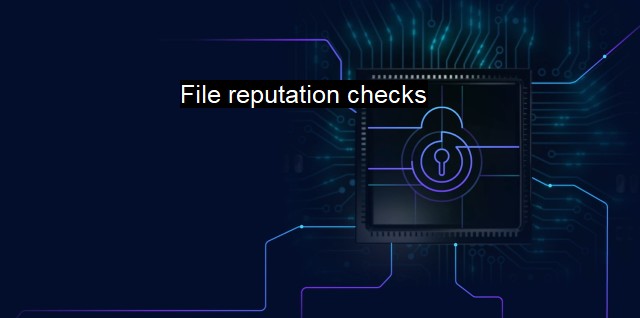What are File reputation checks?
Understanding the Importance and Function of File Reputation Checks in Cybersecurity and Antivirus Protection: Evaluating Trustworthy Files and Detecting Malicious Activity.
File reputation checks refer to the process used in cybersecurity practices to identify and classify files based on their known reputation. These checks are integral to the antivirus defense mechanism and play a significant role in identifying suspicious and malicious activities.An effective computing environment requires assorted files and applications such as executables, drivers, texts, media, and many more. not all files are reliable, and some may have associated potential threats. File reputation checks sieve through the myriads of data to identify endorsements associated with different files, thus assisting in verifying their authenticity.
The gauge of a file’s integrity in the world of cybersecurity lies in its reputation. In specificity, the nature of performance and the history of execution of any particular file define its reputation. This is subject to factors such as the number of times antivirus software has identified the application as unsafe, the origin of the file, or instances traced to its modification.
Through an intricate systematic profile, cybersecurity mechanisms evaluate how much a file can be trusted. For instance, files that have been around for a more extended period tend to be reliable since their integrity has been tested over time. Conversely, new or scarcely known files bear higher risks due to their lesser visibility and lack of historical data. Performing file reputation checks, therefore, encompasses comparing file reputations against a trust score or preset baseline to determine their authenticity.
Multiple antivirus engines drive the capacity of file reputation checks. By cross-analyzing responses from these multiple engines, the system can establish a holistic file reputation. The ranges from safe, unknown, to risky offer a systematic check mechanism that continuously updates in real-time to allow swift changes in status ranking. This acts as a critical filter for avoiding dangers of virus execution or allowing destructive installations.
File reputation checks play a vital role in the realm of whitelisting. They aid in establishing the authenticity of files and applications thereby cutting back on the need for each local antivirus to analyze recognized threats, and making sure recursions are generally safe. This offers greater effectiveness of the heuristics and behavioral analysis that discard malicious counterparts hence enhancing the overall security system.
Another major axis is the extent of cloud-based support imparted to enable such checks. File reputation services use cloud technology to fetch information from a comprehensive database maintained and updated in actual-time over diverse geographical locations. Such databases boast a wide array of file data that an antivirus setup on a local database may lack sight into.
Blazing resource utilization is a massive benefit offered by file reputation checks. By corroborating file identifiers against a large cloud database, possible threats can be singled out more efficiently. It prevents a comprehensive sweep across all files, thus significantly saving on computational and time resources.
File reputation checks also leverage the principle of collective intelligence. Whenever a new threat is recognized in one system, upon alert, the defense perimeter swiftly updates, thus guarding against the network-wide replication.
File reputation checks are the cornerstone of advanced security strategies that deploy controlled environments. Besides enhancing the performance of antivirus software, they provide a potent tool in preemptive network defense by stifling active threats in real-time. An improved awareness of this technology offers a credible and leveraged edge in mapping out cybersecurity. The sophistication brought by file reputation checks to cybersecurity is the active catalyst paving the way to the future when machines will learn, guide, and remarkably protect against threats on their own. Appetence to accommodate maximum inclusivity of such systems in antiviral management is the foreseeable future for intensified cybersecurity.

File reputation checks FAQs
What is file reputation check?
File reputation check is a process that evaluates the trustworthiness of a file or application by analyzing its reputation in the cybersecurity community. This helps antivirus software and other security tools to identify potentially harmful files and prevent them from causing harm to your system.How is file reputation check different from traditional antivirus scanning?
Unlike traditional antivirus scanning, which relies on signature-based detection to identify known malware, file reputation check analyzes the behavior and reputation patterns of a file to determine if it is trustworthy or not. This helps to detect new and emerging threats that may not have been identified previously by signature-based detection.What factors are considered in file reputation checks?
Several factors are considered in file reputation checks, including the age, source, popularity, and distribution of a file. The software’s reputation across different security platforms is also analyzed, with special attention paid to any reported incidents of malware or suspicious behavior.Are file reputation checks reliable in detecting malware?
File reputation checks are highly effective in detecting known malware and emerging threats. However, they are not foolproof, and there is always a risk of false positives or false negatives. Therefore, it’s always recommended to use file reputation checks in conjunction with other cybersecurity measures, such as antivirus scanning and firewalls, to ensure comprehensive protection against cyber-attacks.| | A | | | B | | | C | | | D | | | E | | | F | | | G | | | H | | | I | | | J | | | K | | | L | | | M | |
| | N | | | O | | | P | | | Q | | | R | | | S | | | T | | | U | | | V | | | W | | | X | | | Y | | | Z | |
| | 1 | | | 2 | | | 3 | | | 4 | | | 7 | | | 8 | | |||||||